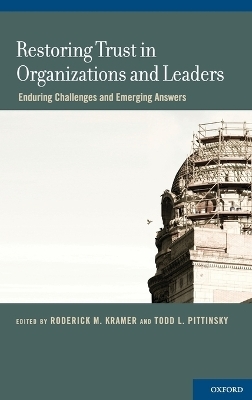
Restoring Trust in Organizations and Leaders
Oxford University Press Inc (Verlag)
978-0-19-975608-7 (ISBN)
The sinking public trust in contemporary institutions is a multifaceted phenomenon with political, sociological, economic, and psychological antecedents and consequences. Restoring Trust in Organizations and Leaders is the first volume to adopt the multidisciplinary approach required to understand this decline and to propose and assess remedies.
Editors Roderick M. Kramer and Todd L. Pittinsky have assembled contributions from leading psychologists, sociologists, economists, and organizational theorists. In response to such blows to public confidence as the scandals in the Roman Catholic Church, numerous corporate accounting frauds, widespread retirement insecurity, the inadequacy of many school systems, and the failure of politicians in the United States and Europe to come to grips with the economic crisis, Restoring Trust offers a compelling and mind-opening mix of theory, examples, and practical prescription for the critical social problem of restoring public trust in organizations, institutions, and their leaders.
Roderick M. Kramer is one of the world's leading social psychologists and organizational behavior theorists. His research examines the antecedents and outcomes of trust and cooperation in organizations. He has also explored the foundations of decision making, creativity, conflict, and leadership. Kramer is William R. Kimball Professor of Organizational Behavior at the Stanford University Graduate School of Business and has been a visiting scholar at several other universities, including the University of Oxford, Harvard University, and the London Business School. Todd L. Pittinsky is Associate Professor of Technology and Society at Stony Brook University. In 2004, he launched the Allophilia Project to study the nature and application of positive attitudes that individuals have about groups other than their own. Prior to joining the Stony Brook faculty, Pittinsky was Associate Professor and Research Director at the Center for Public Leadership at the Harvard Kennedy School. He has published widely on the topics of diversity and leadership and is the co-author of Working Fathers: New Strategies for Balancing Work and Family (Addison-Wesley, 1997) and the editor of Crossing the Divide: Intergroup Leadership in a World of Difference (Harvard Business Review Press, 2009). His book, Us Plus Them: Tapping the Positive Power of Difference, will be published by Harvard Business Review Press in 2012.
Introduction ; Restoring Trust: Problems and Prospects ; Roderick M. Kramer and Todd L. Pittinsky ; Part I: Understanding Why Trust is a Problem:Theoretical Frameworks and Conceptual Issues ; Chapter 1 ; Moral Bases of Public Distrust: Politics, Partisanship, and Compromise ; Ronnie Janoff-Bulman and Michael T. Parker ; Chapter 2 ; "My trust needs to be earned, or I don't give it": Youth's Mental Models of Trust ; Margaret Rundle, Katie Davis, Jen Ryan, John M. Francis, and Howard Gardner ; Chapter 3 ; "I'll Pay Attention When I'm Older": Generational Differences in Trust ; Katie Davis, Jen Ryan, Carrie James, Margaret Rundle, and Howard Gardner ; Chapter 4 ; Institutional Trust Failures: Insights and Lessons from the 9/11 Intelligence Failures ; Roderick M. Kramer ; Part II: Emerging Perspectives on Trust Repair ; Chapter 5 ; The Art of the Apology: The Structure and Effectiveness of Apologies in Trust Repair ; Roy J. Lewicki and Beth Polin ; Chapter 6 ; Risky Trust: How Multi-Entity Teams Develop Trust in a High-Risk Endeavor ; Amy Edmondson and Faaiza Rashid ; Chapter 7 ; The Elasticity of Trust: How to Promote Trust in the Arab Middle East and the United States ; Iris Bohnet, Benedikt Herrmann, Mohamad Al-Ississ, Andrea Robbett, Khalid Al-Yahya, and Richard Zeckhauser ; Chapter 8 ; Building and Re-building Trust: Why Perspective-taking Matters ; Michele Williams ; Chapter 9 ; Restoring Institutional Trust after the Global Financial Crisis: A systemic approach ; Nicole Gillespie, Robert Hurley, Graham Dietz, and Reinhard Bachmann ; Chapter 10 ; Understanding Threats to Leader Trustworthiness: Why It's Better to be called "Incompetent" than "Immoral" ; Kimberly D. Elsbach and Steven C. Currall ; Chapter 11 ; How Victim's Motives Influence the Effect of Apologies: A Motivated Trust Repair Model ; David De Cremer and Pieter Desmet ; Chapter 12 ; Breaking the Vicious Cycle of Low Trust in Decision-Making Authorities: It's What They Do and How They Do It ; Joel Brockner, and Emily C. Bianchi
| Verlagsort | New York |
|---|---|
| Sprache | englisch |
| Maße | 239 x 163 mm |
| Gewicht | 544 g |
| Themenwelt | Geisteswissenschaften ► Psychologie ► Arbeits- und Organisationspsychologie |
| Geisteswissenschaften ► Psychologie ► Sozialpsychologie | |
| Wirtschaft ► Betriebswirtschaft / Management ► Personalwesen | |
| Wirtschaft ► Betriebswirtschaft / Management ► Planung / Organisation | |
| Wirtschaft ► Volkswirtschaftslehre ► Mikroökonomie | |
| ISBN-10 | 0-19-975608-2 / 0199756082 |
| ISBN-13 | 978-0-19-975608-7 / 9780199756087 |
| Zustand | Neuware |
| Informationen gemäß Produktsicherheitsverordnung (GPSR) | |
| Haben Sie eine Frage zum Produkt? |
aus dem Bereich


